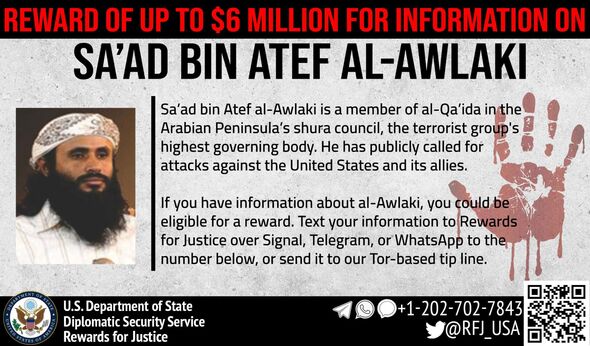Yemen’s al-Qaeda leader threatens Trump, Musk with chilling message over Gaza war
Yemen's al-Qaeda leader issued grave warnings to both the President and Elon Musk while calling for the assassinations of leaders in Egypt, Jordan and the Gulf Arab states.

Saad bin Atef al-Awlaki, the leader of al-Qaeda’s Yemen branch, has sent a chilling warning to President Donald Trump and Elon Musk over the United States’ continued backing for Israel’s ongoing offensive on the Gaza Strip.
In a half-hour online message, he said, “There are no red lines after what happened and is happening to our people in Gaza.” The video was spread online Saturday by supporters of al-Qaeda in the Arabian Peninsula (AQAP) - the Yemeni branch of the armed group.
In the video, al-Awlaki also called for the assassinations of leaders in Egypt, Jordan and the Gulf Arab states over the war, where at least 54,772 Palestinians have been killed over the past 20 months.

Images of Trump and Musk, US Vice President JD Vance, Secretary of State Marco Rubio and Secretary of Defence Pete Hegseth were featured in the video message, which also included logos of Musk’s businesses.
The group headed up by al-Awlaki, known by the acronym AQAP, had been considered the most dangerous branch of al-Qaida still operating after the death of founder Osama bin Laden, who masterminded the Sept. 11, 2001, attacks.
In 2022, a U.S. drone strike in Afghanistan killed bin Laden’s successor, Ayman al-Zawahri, who also helped plot 9/11. The Sept. 11 attacks then began decades of war by the U.S. in Afghanistan and Iraq and fomented the rise of the Islamic State group.
Al-Awlaki already has a $6 million U.S. bounty on his head, as Washington says he “has publicly called for attacks against the United States and its allies.” He replaced AQAP leader Khalid al-Batarfi, whose death was announced by the group in 2024.
The group was born in 2009 from the merger of al-Qaeda’s Yemeni and Saudi factions and is separate from Yemen’s Houthi rebel group.
The group’s seizing of the Israel-Hamas war follows the efforts of Yemen’s Houthi rebels to do the same.
The Houthis launched missile attacks on Israel and targeted commercial vessels moving through the Red Sea corridor, as well as American warships, and the U.S. Navy has described their campaign against them as the most intense combat it has faced since World War II.
The Trump administration also launched its own intense campaign of strikes on the Houthis which only ceased before the president’s recent trip to the Middle East.
The Houthis’ international profile has since been boosted as the group remains mired in Yemen’s long-stalemated war.
Al-Awlaki may be hoping for the same recognition for his group, which U.N. experts have estimated has between 3,000 and 4,000 active fighters and passive members.
AQAP raises money by robbing banks and money exchange shops, as well as smuggling weapons, counterfeiting currencies and ransom operations, according to the U.N.
